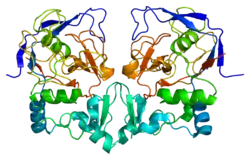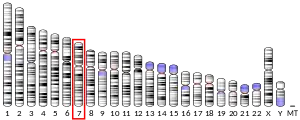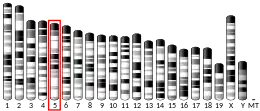SUMF2
Sulfatase-modifying factor 2 is an enzyme that in humans is encoded by the SUMF2 gene.[5][6]
| SUMF2 | |||||||||||||||||||||||||||||||||||||||||||||||||||
|---|---|---|---|---|---|---|---|---|---|---|---|---|---|---|---|---|---|---|---|---|---|---|---|---|---|---|---|---|---|---|---|---|---|---|---|---|---|---|---|---|---|---|---|---|---|---|---|---|---|---|---|
 | |||||||||||||||||||||||||||||||||||||||||||||||||||
| |||||||||||||||||||||||||||||||||||||||||||||||||||
| Identifiers | |||||||||||||||||||||||||||||||||||||||||||||||||||
| Aliases | SUMF2, pFGE, sulfatase modifying factor 2 | ||||||||||||||||||||||||||||||||||||||||||||||||||
| External IDs | OMIM: 607940 MGI: 1915152 HomoloGene: 41037 GeneCards: SUMF2 | ||||||||||||||||||||||||||||||||||||||||||||||||||
| |||||||||||||||||||||||||||||||||||||||||||||||||||
| |||||||||||||||||||||||||||||||||||||||||||||||||||
| |||||||||||||||||||||||||||||||||||||||||||||||||||
| |||||||||||||||||||||||||||||||||||||||||||||||||||
| |||||||||||||||||||||||||||||||||||||||||||||||||||
| Wikidata | |||||||||||||||||||||||||||||||||||||||||||||||||||
| |||||||||||||||||||||||||||||||||||||||||||||||||||
The catalytic sites of sulfatases are only active if they contain a unique amino acid, C-alpha-formylglycine (FGly). The FGly residue is posttranslationally generated from a cysteine by enzymes with FGly-generating activity. The gene described in this record is a member of the sulfatase-modifying factor family and encodes a protein with a DUF323 domain that localizes to the lumen of the endoplasmic reticulum. This protein has low levels of FGly-generating activity but can heterodimerize with another family member - a protein with high levels of FGly-generating activity. Alternate transcriptional splice variants, encoding different isoforms, have been characterized.[6]
References
- GRCh38: Ensembl release 89: ENSG00000129103 - Ensembl, May 2017
- GRCm38: Ensembl release 89: ENSMUSG00000025538 - Ensembl, May 2017
- "Human PubMed Reference:". National Center for Biotechnology Information, U.S. National Library of Medicine.
- "Mouse PubMed Reference:". National Center for Biotechnology Information, U.S. National Library of Medicine.
- Cosma MP, Pepe S, Annunziata I, Newbold RF, Grompe M, Parenti G, Ballabio A (May 2003). "The multiple sulfatase deficiency gene encodes an essential and limiting factor for the activity of sulfatases". Cell. 113 (4): 445–56. doi:10.1016/S0092-8674(03)00348-9. PMID 12757706. S2CID 15095377.
- "Entrez Gene: SUMF2 sulfatase modifying factor 2".
Further reading
- Bonaldo MF, Lennon G, Soares MB (1997). "Normalization and subtraction: two approaches to facilitate gene discovery". Genome Res. 6 (9): 791–806. doi:10.1101/gr.6.9.791. PMID 8889548.
- Strausberg RL, Feingold EA, Grouse LH, et al. (2003). "Generation and initial analysis of more than 15,000 full-length human and mouse cDNA sequences". Proc. Natl. Acad. Sci. U.S.A. 99 (26): 16899–903. Bibcode:2002PNAS...9916899M. doi:10.1073/pnas.242603899. PMC 139241. PMID 12477932.
- Dierks T, Schmidt B, Borissenko LV, et al. (2003). "Multiple sulfatase deficiency is caused by mutations in the gene encoding the human C(alpha)-formylglycine generating enzyme". Cell. 113 (4): 435–44. doi:10.1016/S0092-8674(03)00347-7. PMID 12757705. S2CID 11571659.
- Hillier LW, Fulton RS, Fulton LA, et al. (2003). "The DNA sequence of human chromosome 7". Nature. 424 (6945): 157–64. Bibcode:2003Natur.424..157H. doi:10.1038/nature01782. PMID 12853948.
- Clark HF, Gurney AL, Abaya E, et al. (2003). "The Secreted Protein Discovery Initiative (SPDI), a Large-Scale Effort to Identify Novel Human Secreted and Transmembrane Proteins: A Bioinformatics Assessment". Genome Res. 13 (10): 2265–70. doi:10.1101/gr.1293003. PMC 403697. PMID 12975309.
- Landgrebe J, Dierks T, Schmidt B, von Figura K (2004). "The human SUMF1 gene, required for posttranslational sulfatase modification, defines a new gene family which is conserved from pro- to eukaryotes". Gene. 316: 47–56. doi:10.1016/S0378-1119(03)00746-7. PMID 14563551.
- Colland F, Jacq X, Trouplin V, et al. (2004). "Functional Proteomics Mapping of a Human Signaling Pathway". Genome Res. 14 (7): 1324–32. doi:10.1101/gr.2334104. PMC 442148. PMID 15231748.
- Suzuki Y, Yamashita R, Shirota M, et al. (2004). "Sequence Comparison of Human and Mouse Genes Reveals a Homologous Block Structure in the Promoter Regions". Genome Res. 14 (9): 1711–8. doi:10.1101/gr.2435604. PMC 515316. PMID 15342556.
- Gerhard DS, Wagner L, Feingold EA, et al. (2004). "The Status, Quality, and Expansion of the NIH Full-Length cDNA Project: The Mammalian Gene Collection (MGC)". Genome Res. 14 (10B): 2121–7. doi:10.1101/gr.2596504. PMC 528928. PMID 15489334.
- Dickmanns A, Schmidt B, Rudolph MG, et al. (2005). "Crystal structure of human pFGE, the paralog of the Calpha-formylglycine-generating enzyme". J. Biol. Chem. 280 (15): 15180–7. doi:10.1074/jbc.M414317200. PMID 15687489.
- Mariappan M, Preusser-Kunze A, Balleininger M, et al. (2005). "Expression, localization, structural, and functional characterization of pFGE, the paralog of the Calpha-formylglycine-generating enzyme". J. Biol. Chem. 280 (15): 15173–9. doi:10.1074/jbc.M413698200. PMID 15708861.
- Zito E, Fraldi A, Pepe S, et al. (2005). "Sulphatase activities are regulated by the interaction of sulphatase-modifying factor 1 with SUMF2". EMBO Rep. 6 (7): 655–60. doi:10.1038/sj.embor.7400454. PMC 1369113. PMID 15962010.
- Rual JF, Venkatesan K, Hao T, et al. (2005). "Towards a proteome-scale map of the human protein-protein interaction network". Nature. 437 (7062): 1173–8. Bibcode:2005Natur.437.1173R. doi:10.1038/nature04209. PMID 16189514. S2CID 4427026.
- Otsuki T, Ota T, Nishikawa T, et al. (2007). "Signal sequence and keyword trap in silico for selection of full-length human cDNAs encoding secretion or membrane proteins from oligo-capped cDNA libraries". DNA Res. 12 (2): 117–26. doi:10.1093/dnares/12.2.117. PMID 16303743.
- Kimura K, Wakamatsu A, Suzuki Y, et al. (2006). "Diversification of transcriptional modulation: Large-scale identification and characterization of putative alternative promoters of human genes". Genome Res. 16 (1): 55–65. doi:10.1101/gr.4039406. PMC 1356129. PMID 16344560.




